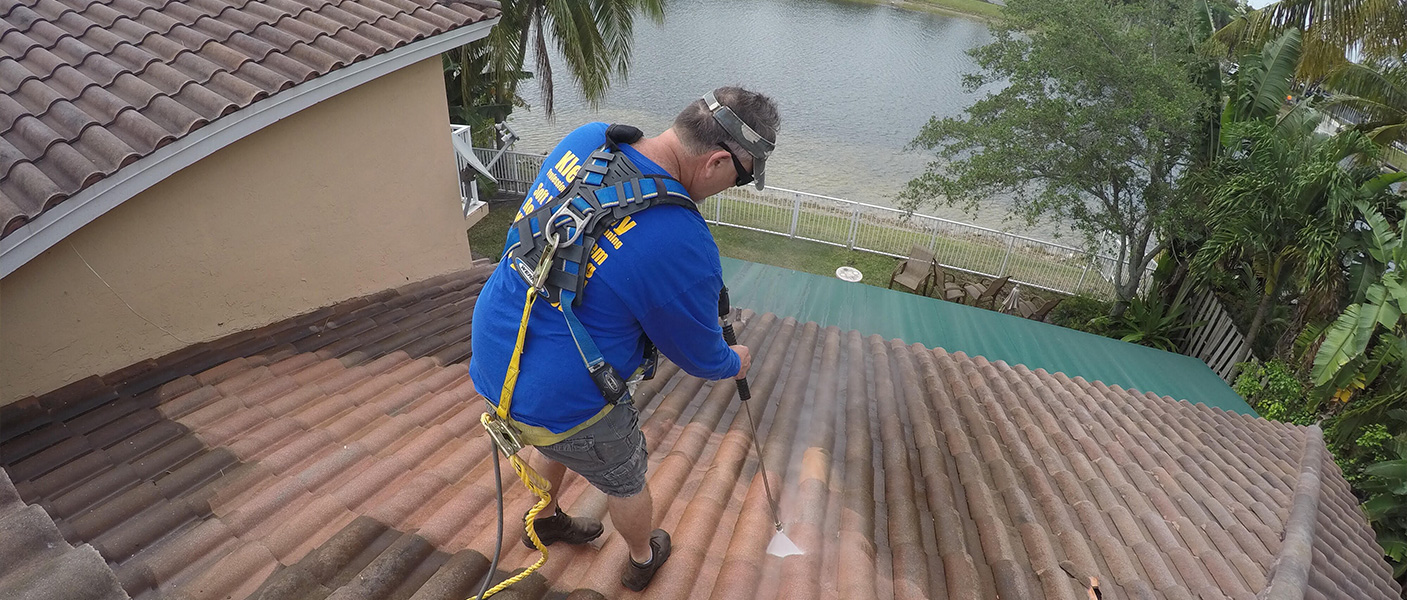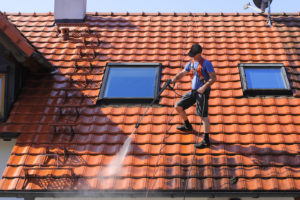Miami, renowned for its vibrant culture and captivating architecture, grapples with a pressing need for roof cleaning amidst its subtropical climate. The prevalence of algae, mold, and other contaminants necessitates regular roof washing to preserve the city’s aesthetic allure and structural integrity. However, Miami’s commitment to environmental stewardship underscores the importance of navigating stringent regulations governing this practice. Balancing the imperative of cleanliness with ecological responsibility is paramount, ensuring the health of both Miami’s buildings and its delicate ecosystems.
I. The Imperative for Roof Washing in Miami:
Nestled within Miami’s lush tropical environment, rooftops serve as fertile grounds for the proliferation of algae and mildew. Consequently, routine roof washing emerges as a vital measure to safeguard buildings against deterioration. Acknowledging its necessity, Miami has implemented regulations to mitigate the environmental impact of roof cleaning, emphasizing the crucial balance between cleanliness and ecological preservation.
II. Local Environmental Concerns:
Miami’s geographical proximity to the Atlantic Ocean and Biscayne Bay underscores the urgency of preserving local ecosystems. Chemical runoff from roof cleaning poses a significant threat to marine life and water quality. To address these concerns, Miami has enacted rigorous regulations to govern the types and quantities of chemicals used in roof washing, prioritizing the protection of its coastal environment.
III. Municipal Regulations on Chemical Usage:
Miami-Dade County, home to Miami, meticulously regulates roof washing practices through the Department of Regulatory and Economic Resources. Stringent guidelines mandate the responsible use of cleaning agents to prevent environmental harm. Contractors and property owners must adhere to regulations concerning chemical concentrations, application methods, and proper disposal of runoff water to ensure compliance with environmental standards.
IV. Promoting Sustainable Practices:
Amidst environmental apprehensions, Miami witnesses a burgeoning adoption of sustainable roof cleaning methods. Many contractors embrace eco-friendly alternatives such as biodegradable cleaning agents and low-pressure washing techniques. These practices not only align with regulations but also exemplify Miami’s commitment to environmental sustainability.
V. Community Awareness and Compliance:
Ensuring effective enforcement of roof washing regulations hinges on fostering community awareness and education. Outreach programs and workshops aim to inform property owners and contractors about the latest regulations. By instilling a sense of collective responsibility, Miami endeavors to uphold the city’s visual appeal while preserving its natural surroundings.
VI. Penalties for Non-Compliance:
Miami demonstrates its dedication to enforcing roof washing regulations through stringent penalties for non-compliance. Violations may result in fines, citations, or legal repercussions. It is imperative for property owners and contractors to comprehend and adhere to these regulations to avoid adverse consequences.
Best Practices for Safe and Effective Roof Washing:
Even in the absence of city-wide regulations, adhering to best practices ensures a safe and efficient roof washing experience in Miami:
Choose the Right Cleaning Method: Opt for low-pressure cleaning methods using soft wash solutions tailored for roofs to avoid damage to shingles.
Prioritize Safety: Equip yourself with proper fall protection gear and refrain from working on wet or slippery roof surfaces.
Consider Professional Assistance: Engage licensed and insured roof cleaning professionals, particularly for complex projects or safety concerns.
Protect Property: Safeguard plants and outdoor furniture from cleaning solutions and runoff.
Environmental Considerations: Opt for eco-friendly cleaning solutions to minimize harm to the environment and local water bodies.
Benefits of Proper Roof Washing in Miami:
Regular roof washing offers numerous advantages in Miami’s unique climate:
Enhanced Curb Appeal: A clean roof contributes to the aesthetic appeal of homes, particularly crucial in Miami’s design-conscious environment.
Extended Roof Lifespan: Removing algae and mildew growth prevents shingle deterioration, prolonging the roof’s lifespan and saving on replacement costs.
Improved Energy Efficiency: Clean roofs reflect sunlight more effectively, potentially reducing cooling expenses during Miami’s sweltering summers.
Reduced Fire Risk: Algae buildup can pose a fire hazard; regular cleaning mitigates this risk.
Enhanced Drainage: Clearing clogged gutters and roof debris prevents water damage, especially prevalent during Miami’s rainy season.
Additional Tips:
Schedule roof washing during moderate temperatures to prevent shingle damage exacerbated by Miami’s heat.
Consider your roof type and consult professionals for appropriate cleaning methods.
Choose reputable and licensed roof cleaning services, such as Kleanway Cleaning Services, known for their expertise and commitment to environmental responsibility.
Conclusion:
Navigating roof washing regulations in Miami requires a delicate balance between cleanliness and environmental stewardship. While adhering to local ordinances and best practices ensures a safe and legal cleaning experience, embracing sustainable methods underscores Miami’s commitment to preserving its natural beauty. By prioritizing safety, employing eco-friendly practices, and seeking professional assistance when necessary, Miami residents can uphold the integrity of their homes while safeguarding the city’s ecological heritage.
Why Kleanway Cleaning Services?
Kleanway Cleaning Services stands out as a beacon of excellence in Miami’s roof cleaning industry. With a reputation for professionalism, expertise, and environmental responsibility, Kleanway Cleaning Services prioritizes sustainable practices and adherence to regulations. Their licensed and insured professionals ensure safe and effective roof maintenance, reflecting Miami’s dedication to both cleanliness and environmental stewardship.




